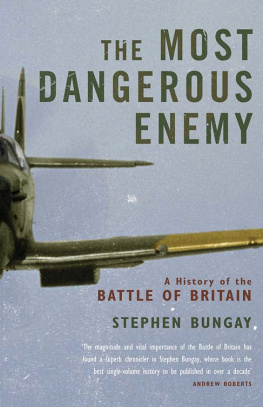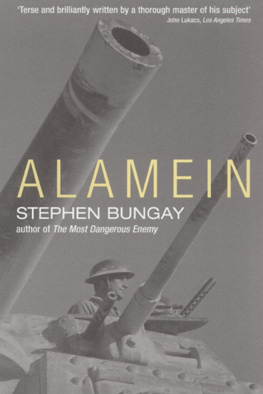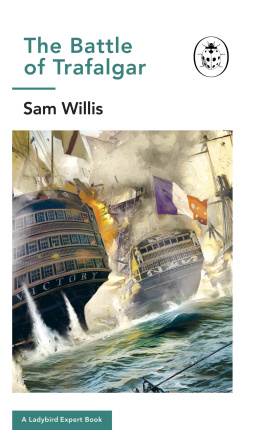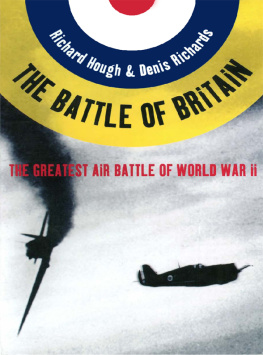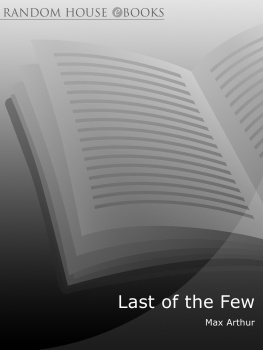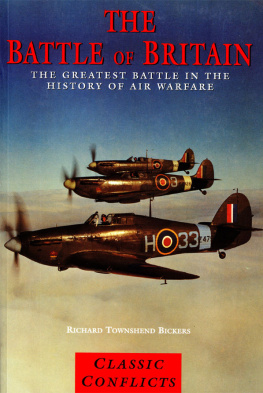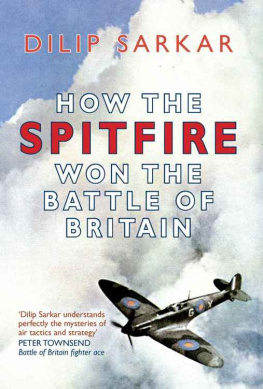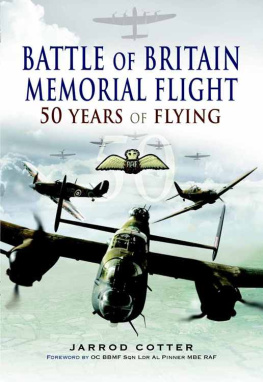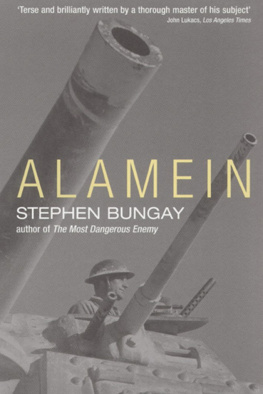Bungay - The Most Dangerous Enemy
Here you can read online Bungay - The Most Dangerous Enemy full text of the book (entire story) in english for free. Download pdf and epub, get meaning, cover and reviews about this ebook. year: 2010, publisher: MBI, genre: Non-fiction. Description of the work, (preface) as well as reviews are available. Best literature library LitArk.com created for fans of good reading and offers a wide selection of genres:
Romance novel
Science fiction
Adventure
Detective
Science
History
Home and family
Prose
Art
Politics
Computer
Non-fiction
Religion
Business
Children
Humor
Choose a favorite category and find really read worthwhile books. Enjoy immersion in the world of imagination, feel the emotions of the characters or learn something new for yourself, make an fascinating discovery.
- Book:The Most Dangerous Enemy
- Author:
- Publisher:MBI
- Genre:
- Year:2010
- Rating:5 / 5
- Favourites:Add to favourites
- Your mark:
- 100
- 1
- 2
- 3
- 4
- 5
The Most Dangerous Enemy: summary, description and annotation
We offer to read an annotation, description, summary or preface (depends on what the author of the book "The Most Dangerous Enemy" wrote himself). If you haven't found the necessary information about the book — write in the comments, we will try to find it.
The Most Dangerous Enemy — read online for free the complete book (whole text) full work
Below is the text of the book, divided by pages. System saving the place of the last page read, allows you to conveniently read the book "The Most Dangerous Enemy" online for free, without having to search again every time where you left off. Put a bookmark, and you can go to the page where you finished reading at any time.
Font size:
Interval:
Bookmark:
Of all Germanys possible enemies,
Britain is the most dangerous.
Oberst Beppo Schmid, Head of Luftwaffe Intelligence, 22 November 1939
This book is dedicated to the memory of
Matthew Buncombe
19581993
much of whose spirit is reflected in the story it tells
Section One
Section Two
The summer was very hot, the school holidays were long, and I was bored.
We lived in Bexley in north Kent, on the edge of south-east London. Bexley was a village then, a few miles south of the River Thames. The railway line up to Charing Cross in London ran along the bottom of the garden, and beyond lay fields and woods. Dad was digging the vegetable patch as usual. I asked him to tell me a story. He had already told me three that day and was getting a bit weary. You can read perfectly well yourself, he said. Why dont you find a book?
Back in the house, I discovered a slim volume on Dads bookshelf. It was a bit old and tattered, but it was in little writing of the kind grown-ups read, and contained lots of drawings and photographs, so it had to be a clever book.
I took it out into the garden. As I looked through it, I realised that it was about the time when Mum and Dad had been bombed and watched hordes of German planes flying up the Thames. They had grown up in Erith on the south bank of the river, where Nanna and Grandad still lived. Uncle Bill had told me about how he ran into the street one day when the bombers were there and saw a blackened head rolling across the road. He dashed over to have a proper look at it and was disappointed to discover that it was a just a chimney pot. Even so, I wished I could have seen it. It all sounded really exciting. One of our most important fighter stations, Biggin Hill, on the North Downs, was in fact only about ten miles away to the south. The Germans must have flown over my house on their way to London. As I lay in the garden, I was looking up at a battlefield!
The narrative of the action was a bit of a challenge, so I stuck to the photograph captions at first: Sheer weight of numbers; The enemy aircraft spun down; and, best of all, the classic Achtung, Schpitfeuer! I knew about Spitfires already because the boy next door had a model of one I was not allowed to touch, which added greatly to its mystique.
It was time to get to grips with the text.
In it I met for the first time the fat and boastful Gring, who claimed his aircraft were definitely superior. I gazed with satisfaction at a very technical-looking graphic display showing that the Spitfire was the fastest thing in the air. I nevertheless harboured a guilty admiration for the Boulton-Paul Defiant not as fast, but it had a wonderful turret with a whole battery of guns that could fire in any direction, which obviously made it very dangerous.
The British were very careful and well organised: No squadron was ever thrown into the fight without previous experience of fighting. The German fighter formations were large and unwieldy. Gring still believed in superior numbers. These would win the trick. They had brought him victory in Poland, Norway, the Low Countries, Belgium and France; they might still bring victory in Britain. Not jolly likely! We shot down 180 planes on 15 August alone and were regularly getting kill-ratios of seven to one. The Germans thought they were superior. Their pilots were brave because they were fanatics, and kept on coming despite the terrible beating they were getting. However, our boys were braver and better still. They were enormously outnumbered, but none of them minded.
The message was clear enough. Gring was a bullying show-off who could beat other foreigners, but soon got his come-uppance when he tried it on with us. We were afraid of no-one, and cut the bad boys down to size if they started pushing the little ones around, no matter how big and ugly they were. The height of moral rectitude was to stand up to bullies. The greatest moral opprobrium was reserved for show-offs.
This little work was a pamphlet published by the Air Ministry in 1941, called The Battle of Britain. During the war it sold two million copies, and had a considerable influence on the British publics view of the conflict. It also shaped mine.
The Battle of Britain story as handed down to me is epic myth. People needed myths in 1940. The Nazis were strong on myth, using Germanic legends and heroes and creating a Party mythology with a shabby little pantheon of its own. They deliberately portrayed their own fighter pilots as warrior-heroes. Knowing that the British would not fight for an abstraction, Churchill started a myth for the British in 1940 which still fires the popular imagination.
Britains lone stand against Nazism in 1940 is as much a national epic as the Trojan war was for the Greeks of Homers time. The story fulfils the archetypal role of epic literature by defining the identity of a nation through a clash with another in the contrast with this alien power and also in its relationship to divine powers. The protagonists in the action are heroes.
The British are the ones who saved their army in little ships at Dunkirk, refused to give in, and won against all the odds. Divine providence is at hand. Dunkirk was a miracle. Radar is a magical force in the background, invented by the British. The air battle reaches a point of crisis when another miracle occurs: the enemy makes a fatal error and changes the target of his attacks. As in most epic myths, the hero possesses a magic weapon in this case not a sword, like Excalibur, but an aeroplane: the Spitfire. Its designer, Reginald Mitchell, was a martyr, sacrificing his health for his vital work. The heroes, as Churchill intended, are the pilots. Achilles had divine lineage, as many heroes do, but he was pagan. The Few were Christian heroes. Their official sanctification began with the inauguration of the Battle of Britain Memorial at Westminster Abbey by King George VI on 10 July 1947, and has continued ever since.
Myths speak to deep psychological needs and so are extremely resilient. The OED describes the verb vaunt, meaning to boast or brag, as rhetorical and archaic. I am not aware of having heard or read this word in any other context.
As I left childhood behind, I came to feel that the country of my birth, which had been so heroic, was by most modern measures second-rate. Its economy was failing, the unions were always on strike, and politicians bickered with each other. The past seemed more attractive than the present or the future. As a student, I spent some time in Germany, which was clean, affluent and orderly. Its economy worked and it did not seem to breed football hooligans. All the finest hour stuff began to look rather embarrassing. If 1940 had been a defining moment, what had really happened, and what qualities did people then really display? Were they all gone?
In the 1980s, some books appeared suggesting that admirable qualities had never really been there at all. Clive Ponting has debunked the whole of 1940, Dunkirk and all, Dizzy Allen has debunked the battle, and Corelli Barnett has shown that the British economy was in a parlous state and has even had a go at the Spitfire Herself. By the 1990s, Churchills time had also come, with some historians questioning whether he was right to continue the war at all, given what it cost. The spirit of Lord Halifax is back.
Some of the debunkers have a crude understanding of myth. The word is used simply to mean untrue and is usually opposed to reality. Debunkers typically oppose it by assembling some facts which they think refute it. As Angus Calder points out, they run up against the Big Fact, which is that the British, even if in reality they were cowardly and incompetent, won the Battle of Britain. Myth is not about correctness or incorrectness: it is about the story that emerges from the totality of facts. The story is about community identity and collective values. Myth can only be challenged by offering alternative explanations of how and why things happened.
Font size:
Interval:
Bookmark:
Similar books «The Most Dangerous Enemy»
Look at similar books to The Most Dangerous Enemy. We have selected literature similar in name and meaning in the hope of providing readers with more options to find new, interesting, not yet read works.
Discussion, reviews of the book The Most Dangerous Enemy and just readers' own opinions. Leave your comments, write what you think about the work, its meaning or the main characters. Specify what exactly you liked and what you didn't like, and why you think so.

